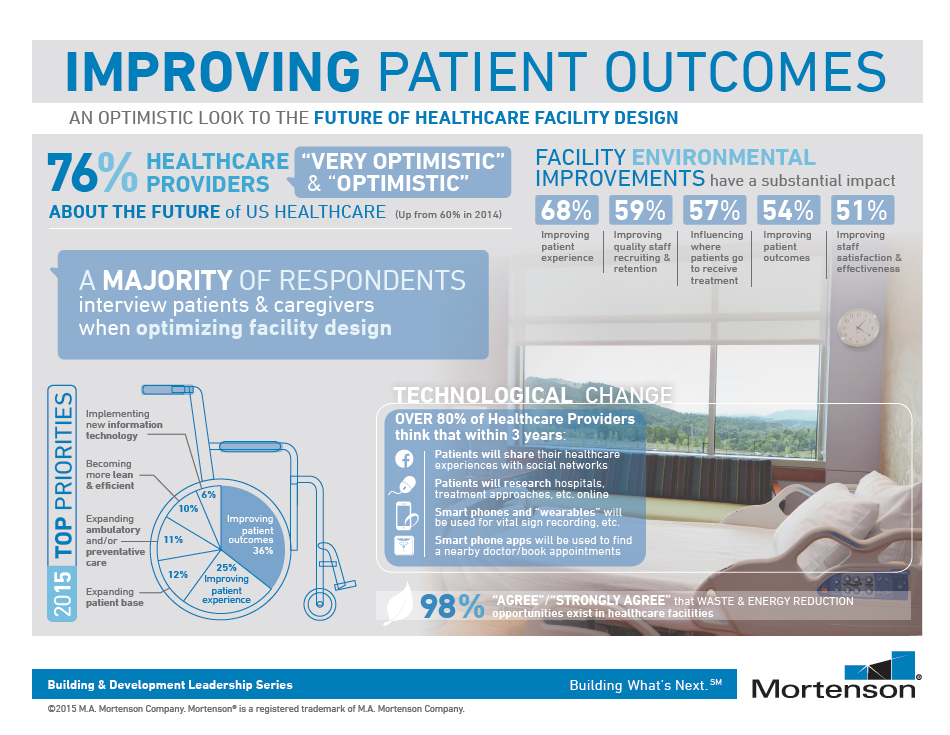Despite overall optimism in healthcare, support for the Affordable Care Act (ACA) has lessened, according to a study from Mortenson.
Nearly eight out of 10 healthcare providers feel that legislation needs significant changes or revisions. The 2015 Mortenson Healthcare Industry Study found that only one-third of providers think that the ACA would lower the per-patient cost of healthcare.
But, providers are confident in advances in facility design, IT, waste and energy reduction, and environmental improvements, and they believe that transparency and patients’ concern in their own wellness will improve the sector as a whole. The study says that 76% of healthcare providers feel “very optimistic” or “optimistic” about the future of healthcare.
The report also found that providers predict that virtual care will become more common, and that providers link physical healthcare facilities and environments with patient outcomes.
"The healthcare market is still in the process of adapting to a new normal," said Bob Nartonis, SVP and National Healthcare Market Leader at Mortenson, in a statement. "There are several challenging dynamics facing healthcare service providers today but they are optimistic as a whole. We are encouraged to see healthcare facility design, interest in the patient experience, and changes in technology continuing to drive innovation in the market."
The full report is available here.

Related Stories
| Aug 8, 2016
HEALTHCARE GIANTS: Age-simulation technology aids design for the mobility impaired
As the 65+ population continues to rise, the AEC industry needs to better understand the stresses and anxieties those who are mobility impaired face when navigating spaces like medical facilities.
| Aug 8, 2016
Top 80 Healthcare Engineering Firms
AECOM, Jacobs, and WSP | Parsons Brinckerhoff top Building Design+Construction’s annual ranking of the nation’s largest healthcare building sector engineering and E/A firms, as reported in the 2016 Giants 300 Report.
| Aug 8, 2016
Top 100 Healthcare Construction Firms
Turner Construction Co., McCarthy Holdings, and Skanska USA top Building Design+Construction’s annual ranking of the nation’s largest healthcare building sector construction and construction management firms, as reported in the 2016 Giants 300 Report.
| Aug 8, 2016
Top 90 Healthcare Architecture Firms
HDR, Stantec, and Perkins+Will top Building Design+Construction’s annual ranking of the nation’s largest healthcare building sector architecture and A/E firms, as reported in the 2016 Giants 300 Report.
Healthcare Facilities | Jul 25, 2016
AIA selects seven winners of healthcare building design award
The National Healthcare Design Awards recognizes functional hospital projects that solve aesthetic, civic, urban, and social concerns. Recipients were selected in three categories this year.
Architects | Jul 22, 2016
5 creative approaches to finish standards
With the right mindset, standards can produce great design for healthcare facilities, as VOA's Candace Small explores.
Healthcare Facilities | Jul 20, 2016
Process mapping simplifies healthcare design
Charting procedures and highlighting improvement opportunities can lead to developing effective design strategy simulations. GS&P’s Ray Wong writes that process mapping adds value to a project and bolsters team and stakeholder collaboration.
Sponsored | Building Technology | Jul 11, 2016
3D scanning technology solves University of Iowa Children’s Hospital’s curved wall curveball
Gilbane Building Company utilized advanced 3D scanning technology as part of a virtual design and construction (VDC) solution to ensure quality control throughout the lifespan of the project
Healthcare Facilities | Jul 7, 2016
How to navigate the tedious regulatory approval process in healthcare construction
Compliance processes can be handled efficiently with a little bit of foresight. CBRE's Patrick Duke, Kyle Marden, and David Vollmer evaluate the regulations and permits that may be required and the process for incorporating approvals into projects.
Healthcare Facilities | Jul 1, 2016
AIA releases summary of the 2016 Design and Health Research Consortium
Consortium members discussed how architects, designers, and health professionals can best apply design and health research in their communities.

















